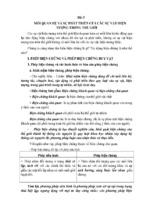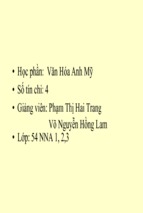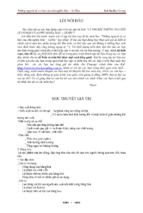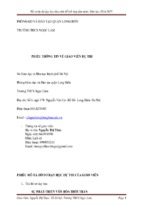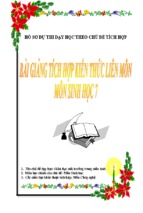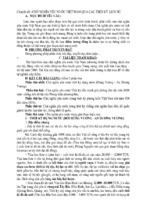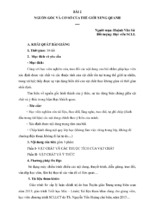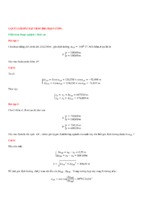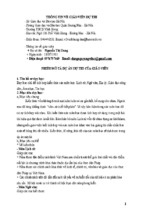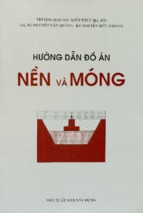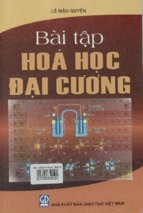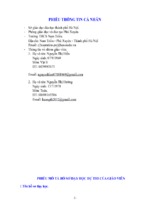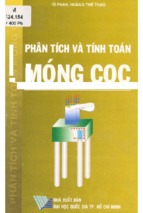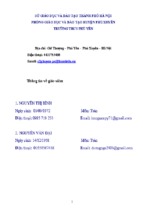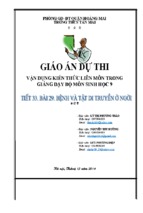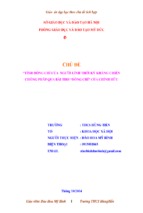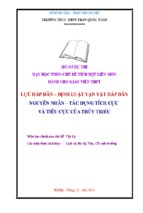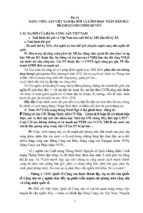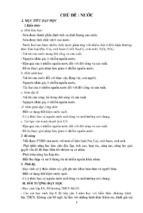Grade 12
Unit 1 – Life stories
I. Write the words given in the box next to their meanings.
distinguished
generosity
achievement
respectable
talented
1……………………….….gifted, having a natural ability to do something well.
2……………………….…very successful and admired by other people.
3……………………….….regarded by society as acceptable, proper and correct.
4……………………….…kindness or willingness to give.
5……………………….…something that has been obtained by hard work, ability or effort.
II. Fill in each sentence with a word from the box.
distinguished
achievement
respectable
talented
generosity
1. Alexandre Yersin, who had quite a …………………. career in medicine, devoted his life
to the poor and sick people in Vietnam.
2. Hard-working and …………….. students should be given more opportunities to develop
their skills.
3. The new album is one of his greatest ………………………. It sold 50,000 copies just in
the first week.
4. After my father got a well-paid job at an international company, we moved to
a …….…………… neighbourhood.
5. Don’t allow other people to take advantage of your ………………….. You should learn to
give wisely.
III. Put the verbs in brackets in the past simple or the past continuos
1. This morning when the alarm clock (go) …..……… off, I (have) ………………… a sweet
dream.
2. Carol (meet) …………….. her husband while she (travel) …………………… in Europe.
3. I (work) …………… on my computer when there (be) ………………..a sudden power cut
and all my data (be) …………………..lost.
4. When we (share) ………………. a room two years ago, Lin (always,
take) ……………………. My
things without asking.
5. When Tom (call) ………………… yesterday, I (do) ………………… the washing-up in
the kitchen,
so I (not hear) ……………………….. the phone.
6. Frank (constantly, ask) ………………….. for money last year when he (be) ………. still
out of work.
7. Mark (request) ……………….. complete silence when he
(compose) …………………… music.
8. In 1417, Nguyen Trai (join) ………..the army of Le Loi, who (then,
lead) …………………. the
resistance movement in the mountainous regions.
IV. Complete the gaps with the where necessary. If an article is not necessary, write a
cross (x)
1. Here’s …………… book you asked to borrow.
2. There are some reports on ………….. oil slick in ……………. Mediterranean Sea.
3 ………….. kangaroos are found only in ………….. Australia.
4. Angelina is working for a charitable organisation that helps ………….. people with
disabilities.
5. Is …………. United Arab Emirates part of ………… South Asia or ………….Middle
East?
6. Last summer, we travelled to many places. We visited ………Taj Mahal in ……… India,
climbed ……… Mount Everest in …………..Himalayas, and took a cruise
to ………….. Bahamas.
7. I love ……….. Spain. I find …………. Spanish very friendly, but I can’t say much
in ………. Spanish.
8. My favourite pastime is playing …………. guitar, but my best friend prefers
playing ………… tennis.
V. Complete the gaps with a, an or a cross (x) if an article is not necessary.
1. There’s ……… chance that she’ll win the competition again.
2. What ………. nice weather! Let’s go for ………. picnic.
3. I went to see …….. Dr Nga yesterday because I had ……fever. She asked me to stay
in …….. bed for two days.
4. My friend Brian is ……..Scot. On ………. special occasions, he wears …… kilt and plays
the bagpipe.
5. I’m not talking about …… global warming, but traffic congestion. This is
quite …. different problem
in our city.
6. The teacher gave us ……. test on ……. indefinite articles yesterday. It wasn't easy, but I
could
get …….. good mark in the test.
7. I like …………. ice cream, but I’m not in the mood for …………… ice cream now.
8. A: Let’s go for ………….coffee.
B: No, thanks. I don’t drink …………… coffee.
VI. Read the following story and complete each gap with an article. Write a cross (x) if
an article is not necessary.
I had (1) …….. very bad experience (2) …….. last Sunday. I bought (3) …….. flash drive
from (4) ………. computer store in (5) ………. local shopping centre. When I went
back (6) ……. home, I inserted it into my computer, but it was not recognised. I took it back
to (7) ……. store, but (8) ……. store manager got very angry. He pointed
at (9) ……….. crack on (10) ………. flash drive, and said his store was not responsible for
such (11) ………..defect because it had probably been caused by my carelessness. I couldn’t
say (12) ………. word, and had to buy another flash drive.
VII. Read the text about Arthur Ignatius Conan Doyle and decide whether the
statements about it are true (T), false (F), or not given (NG)
ARTHUR CONAN DOYLE
Sir Arthur Ignatius Conan Doyle was a Scottish writer and physician. He is best known for
his creation of Sherlock Holmes - a brilliant London-based detective famous for his logical
thinking
and
ability
to
solve
difficult
cases.
Born in Edinburgh in 1859 into a prosperous family, Doyle was strongly influenced by his
mother, who was a well-educated woman. In his early childhood, she used to tell him vivid
stories which sparked his imagination. The second person who had a great impact on his
writing career was Dr Joseph Bell, a professor at the medical school where Doyle studied
from 1876 to 1881. Dr Bell’s keen powers of observation later inspired Doyle to create his
fictional detective character, Sherlock Holmes.
Doyle’s active life provided him with vivid experiences for his stories. With a great love for
adventure, he would never miss a chance to travel. He took a surgeon’s position on a whaling
ship sailing for the Arctic Circle. He served as a volunteer doctor in the Langman Hospital in
South Africa during the War of Independence in 1900. He also acted as a war journalist
during the First World War.
Doyle’s writing career started during his time at medical school. After graduation, he set up
his own medical practice, which was not very successful initially, so he started writing stories
again while waiting for patients. He wrote 21 novels and more than 150 short stories. He also
published poems, articles, memoirs and plays on various subjects. His most well-known
works are the novels and stories with Sherlock Holmes and the fantasy novel The Lost World,
which were made into successful films.
Doyle died at the age of 71, after a heart attack. In his honour, a statue of him was built in
Crowborough, where he lived for almost 23 years.
1. Arthur Conan Doyle’s stories about Sherlock Holmes were the first detective stories in the
world.
2. The two people who had a strong influence on Doyle’s writing career were his mother and
Dr Joseph Bell.
3. Doyle’s mother inspired him to write about Sherlock Holmes.
4. Doyle’s life experiences were sources for many of his stories
5. The Lost World and his novels and stories about Sherlock Holmes were made into films.
6. A statue of Sherlock Holmes was built in London.
VIII. Fill in each sentence with a word/ phrase from the box.
distinguished
historical figures
respectable dedication
achievement
reputation
1. Naming streets after …………………………….. is a common practice around the world.
2. After winning the MasterChef competition, Christine Ha gained a(n) …………… as a
first-class cook.
3. You’ll look more …………………. if you wear a nice suit and a tie.
4. No one can deny his hard work and ………………… to the club.
5. After a series of successes, she won a lifetime ………………….. award for music.
6. Nguyen Trai had a(n) …………………… career as a skilled strategist and prominent
scholar.
IX. Read the following story about Tran Quoc Toan. Put the verbs in brackets in the
past simple or the past continuous
Marquis Hoai Van Tran Quoc Toan (1. be) ……….born in 1267. In 1279, Kublai Khan of
the Mongol Empire (2. begin) ………………. his attempt to take over Dai Viet and Champa.
Facing threat from the north, in October 1282, Dai Viet’s Emperor (3.
gather) …………… all members of the royal family and officials in the royal court to discuss
ways to defend the country. The 15-year-old Tran Quoc Toan (4. be) ……. not invited to the
assembly because he was too young. He (5. become) ……………. very upset. As he (6.
shout) ……………. angrily outside the royal court, the emperor (7. come) …… out and (8.
give) ………….him an orange. He also (9. order) …….. the young marquis to go home.
While the emperor and the officials (10. discuss) ……………….……….. the war strategies,
Tran Quoc Toan (11. still, wait) ………………… outside the hall. He (12. get) ………… so
upset and stimulated that he (13. crush) …………….the orange with his own hand. Later he
(14. begin) ………… forming his own army and (15. manage) ……………. to recruit over
one thousand soldiers. While his troops (16. fight) ………………… against the Mongol
army, he (17. always, dash) ………………..……. to the front to drive the enemies back. His
death was unknown, but today Tran Quoc Toan is considered one of the finest examples of
Vietnamese patriotism, especially for the young generation.
X. These sentences are incorrect. Correct them, adding articles where necessary
1. We had great time in USA last summer.
2. John decided to join army and become soldier so that he could fight for country.
3. Do English drink tea or coffee at breakfast?
4. We returned from two-week holiday in Philippines and Indonesia.
5. When you go to Paris, don’t forget to visit Louvre and take boat trip along Seine.
6. You’ll need warm hat, new coat and pair of woolen gloves for your trip to Europe this
season.
7. My mother said she would go to bank on Fir Street to withdraw some money, and then she
would drop by supermarket near theatre on way home.
8. In rush hour in Ha Noi, it’s more convenient to travel by motorbike than to take taxi.
.XI. Fill in each sentence with a word/ phrase from the box.
distinguished
dedication
reputation
talented
perseverance
generosity
figures
1. His tireless ……………………. to protect endangered animals was greatly admired.
2. Hard work and …………………… help tennis players to succeed in their sporting career.
3. It’s not easy to build a good ………………………, but it’s even more difficult to protect
it.
4. The company is looking for ………… graduates from fashion colleges, who are willing to
work hard.
5. The world would be a better place if more people showed …………….. to others.
6. Our ………………….. guests have just arrived. Let’s welcome them with a big round of
applause.
7. Winston Churchill was one of the most dominant ………… in British politics.
XII. Put the verbs in brackets in the past simple or the past continuous
1. This afternoon I (see) ………….. Dingo, the boxing champion, at the airport. When I
(leave) ……… the airport at 5 p.m., he (still, talk) …………………….. to the customs
officer. He (look) …………. really worried. Then while I (wait) ………………. for a taxi, I
(hear) ……………. that he (have) …………………… problems with his luggage.
2. Sue: (you, hear) …………………………. the news about Tim?
Ken: You mean the famous film star? What (happen) ………………………….?
Sue: He (fall) …………… from the sixth floor when they (film) ………………….. a scene
of a burning building. He (play) …………………… a fireman trying to save a child.
Ken: What a shock! Is he all right?
Sue: I don’t know. I just (read) ……………… the news on social media. They
(say) ……………. doctors (still, operate) …………………………….. on him.
XIII. Read the following story and complete each gap with an article. Write a cross (x)
if an article is not necessary.
Marco Polo was born in 1254, in (1) ………..Venice, (2) ………. Italy,
into (3) ……….. wealthy merchant family. He travelled extensively with his family,
journeying from (4) ……………... Europe to (5) ………. Asia from 1271 to 1295. He lived
in (6) ………….China for about 17 years. There has been (7) …………. debate
among (8) ………..….. historians about whether Marco ever really made it
to (9) ………………….. China. There is no evidence outside his famous book that he had
ever travelled to (10) ……….. Far East. Yet, his knowledge of (11) …………. culture of this
area is hard to dismiss
XIV. Underline ten mistakes in the conversation
and correct them
Van: What’s a book you’re reading about?
Quang: Pelé’s life story. It’s quite interesting. You can learn more about his life and career.
Van: When does he start playing the football?
Quang: When he was a teenager. And at an age of 15, he was gaining a reputation as the
powerful goal scorer.
Van: I see. But why is he considered a greatest of all football players?
Quang: Pelé was scoring 1,281 goals in 1,363 games, which is the remarkable achievement
since he was always surrounded by the defenders of the opposing team.
Van: I want to know more about him. Can I borrow a book?
XV. Read the first part of the text about Beethoven and fill in each gap with a word
from the box.
talent
distinguished
prodigy
innovator
performance
compose
greatest
create
Ludwig van Beethoven was a German composer and (1) ………………. musical
figure in the period between the Classical and Romantic eras. Born in 1770, in Bonn,
Germany, he was the son of a court musician. His piano (2) ………… quickly became
evident and he gave his first public (3) ………….. at the age of eight. Beethoven’s father
wanted to make him a child (4) …………., another Mozart.
Considered the (5) ……………….. composer of all time, he was a noted (6) …………….,
combining vocals and instruments in a new way. Beethoven continued
to (7) …………….. even while losing his hearing, and some of his most important works
were (8) ……………….. during the last 10 years of his life, when he was quite unable to
hear.
Grade 12
Unit 2 – Urbanisation
I. Read the second part of the text and find words or phrases from the two sections of
the text which mean the following
There are three main periods in Beethoven’s music career: early, middle and late.
The beginning of his early period was in 1792 when he moved to Vienna, Austria. Beethoven
quickly made a name for himself as a talented pianist. His compositions during this period
consisted mainly of works for his main instrument, the piano, and were classical in nature.
However, Beethoven’s hearing was beginning to deteriorate during this period, and he tried
to hide this fact from those around him.
In 1800, Beethoven turned from the classical forms of the previous century to a more
expressive or romantic music. His musical imagination began to grow beyond that of the
piano. The middle period was believed to be Beethoven’s greatest and most productive stage.
In less than a decade, he produced countless masterpieces in every genre.
In 1809, however, his musical creativity began to decline, possibly due to his health
problems and mental state. Beethoven stopped conducting and performing in public, but
continued to compose – many of his most admired works were created during this period. By
1815, he was almost completely deaf and his manners became increasingly rude. In 1827, he
died after a long illness. Nearly 20,000 people lined the streets of Vienna to pay their last
respect to the composer who had changed the music scene of Western Europe.
1. a person, especially a child or young person, having extraordinary talent or ability
2. a piece of music that is sung, rather than played on a musical instrument
3. become worse
4. producing or achieving a lot
5. too many to be counted
6. the best or most excellent works of an artist
7. a particular type of writing, art, music, etc. which shares specific features
II. Match the words with the appropriate definition
1. urbanisation (n)
a. the period of time when a country develops a lot of industries on a
2. overload (v)
wide scale
3. industrialisation
b. a population shift from rural to urban areas
(n)
c. stop paying attention
4. agricultural (adj) d. relating to the practice or science of farming
5. switch off (v)
e. give too much information, work or responsibility
III. Fill in each sentence with a word from the box.
urbanisation
overload
industrialisation
agricultural
switched off
1. The impact of increased …………………… has been harmful to the environment and has
led to the growth of greenhouse gas emissions.
2. Students can easily …………………… their short-term memory with unnecessary
information.
3. The lecture was two hours long and boring, so by the end of it, I
completely ………………….
4. Before the Industrial Revolution in England, the majority of the population were employed
as ………………………. labourers.
5. The transformation of China into a modern economy started in 1950s through the process
of ………………………………….
IV. Complete the text below with the compound adjectives given in the box.
long-term
fast-growing
weather-beaten
well-paid
up-todate
Many young people in rural areas don’t want to spend their lives on the farm like
their (1) ………… …………. parents. They understand that there are
better (2) ………………. job prospects for them in the city. So they leave their home villages
to find (3) ………………... jobs in the (4) …………… industrial zones. In the city, young
people can also have access to (5) ………………. facilities and technology.
V. Complete the sentences, using the correct form of the verbs in brackets
1. It is important that he (get) ………………….. into a good university.
2. The teacher demanded that the classroom (clean) …………………………… immediately.
3. My father insists that my brother (work) …………………….. on the farm.
4. It is vital that people (allow) ………………………… to choose where to live.
5. I requested that everyone in my class (attend) ……………………… my presentation.
6. It is crucial that urban people (not look down on) …………………………. …..rural
people.
VI. Complete the text below with the verbs given in the box.
tell
return
study
obey
search
1. Her parents insisted that she …………………… hard for the GCSE exams.
2. It is essential that young people from rural areas ………………… the truth about city life.
3. It is imperative that all migrants ……………….. the rules and regulations of the
residential areas they move to.
4. The police demanded that the stolen money ………………………. to the bank.
5. It is a good idea that the police ……………………………………. for the missing people.
VII. Match the words with their meanings
1. mindset (n)
a. buildings and other shelters that people live in; provision of
2. discrimination (n) accommodation
3. housing (n)
b. supporting new and modern ideas and favouring change
4. sanitation (n)
c. the protection of public health by removing and treating dirty water,
5. progressive (adj) waste, etc.
d. the established set of habitual attitudes held by a person or group
e. the practice of treating one person or group unfairly because of their
sex, race or age
VIII. Rewrite the sentences without changing their meaning
1. The migration of young people to big cities has risen dramatically.
→ There ………………………………………………………………………………………
2. Due to shortages of jobs, there has been a decrease in the population in rural areas in the
last 10 years.
→ Due to shortages of jobs, the population …………………………………………………...
3. The urbanisation rate in Indonesia increased by over 30% from 1969 to 2009.
→ There ………………………………………………………………………………………
4. There was a sharp rise in the rate of urbanisation in South Korea during the period between
1969 and 1989.
→ The rate of
urbanisation ……………………………………………………………………..
5. The urbanisation rate in this city decreased slightly during the economic crisis in 2008.
→ There was …………………………………………………………………………………...
6. The number of young people working on farms has decreased sharply over the past years.
→ There ………………………………………………………………………………………
7. The number of urban inhabitants rose by 15% from 1990 to 1995.
→ There ………………………………………………………………………………………
IX. Underline the correct word in each sentence
1. High crime rate is considered to be the worst effect of (industrialisation/ urbanisation).
2. (Industrial/ Agricultural) zones are developing rapidly in the urban areas.
3. More and more people are migrating to (urban/ rural) areas to look for better job
opportunities.
4. The cost of living in big cities has (fallen/ risen) dramatically over the past years. This has
caused a lot of difficulties for low-income people.
5. The talk was long and overloaded with useless information, so I switched (on/ off).
X. Complete the text below with the compound adjectives given in the box.
thought-provoking
day-to-day
wide-ranging
never-ending
weatherbeaten
1. The new law has ……………………… effects on the migrants.
2. In big cities, sometimes we can see ………………… faces of people migrating from the
rural areas.
3. We attended an in-depth and ………………… presentation on urbanisation and its impact
on society.
4. Governments should try to limit the ………………….. growth of cities.
5. Poor people in big cities still have to deal with many ………………….. problems.
XI. Complete the sentences, using the correct form of the verbs in brackets
1. The girls in our class proposed that our teacher (organise) ………… a camping trip in the
countryside.
2. Miss Kim recommended that our class (divide) …………… into six groups to work on the
unit project.
3. Lan is now living in the city. Her parents are still living in their home village. They insist
that Lan (call) ……………………. home every day.
4. It is important that parents (give) ……………. their children’s academic results at the end
of each term.
5. The local authority demanded that local residents (support) ………………………… new
migrants.
.XII. Choose the word whose underlined part is pronounced differently from the rest in
each group by circling A, B, C, or D.
1. A. life
B. site
C. widen
D. recipe
2. A. idea
B. bear
C. area
D. hear
3. A. share
B. age
C. safe
D. place
4. A. great
B. meat
C. wheat
D. beat
5. A. sour
B. our
C. pour
D. flour
XI. Use the correct form of the words in the box to complete each sentence.
year-round (adj)
thought-provoking (adj)
weather-beaten (adj)
well-paid (adj)
fast-growing (adj)
overload (v)
1. Students these days are ……………………. with too much unnecessary information.
2. He has the ………………………. face and skin of an old traveller.
3. In …………………….. cities, people have access to jobs, healthcare and other facilities.
4. It is difficult for young people to find ………………. jobs in rural areas.
5. The documentary about life in the slums was really ……………….. and was followed by a
lot of discussion about how to solve this problem.
6. Life in areas with …………………….. extreme weather conditions is not easy at all.
XI. Complete the sentences, using the correct form of the verbs in brackets
1. The government requested that local authorities (clear) ……..…. all slums and
(support) ….………. migrants in finding low-cost housing.
2. My parents insisted that my brother (return) …………… to our home village after
graduation to run the family business.
3. It is essential that new migrants (give) ……….. enough information about the rules and
regulations of the local area.
4. It is desirable that everyone (have) …………. a flat in the city and a villa in the
countryside.
5. It is recommended that the government (control) …… urbanisation to maintain sustainable
urban areas.
6. It is important that young people (not, idealise) ……………….. city life.
II. Rewrite the sentences without changing their meaning
1. The urban population ratio rose steadily throughout the period.
⇒ There ……………………………………………………………………………...
2. There was a continuous fall in the rural population ratio during this 60-year period.
⇒ The ………………………………………………………………………………..
3. The urban population ratio rose from 25% to 45% between 1950 and 1980.
⇒ There ……………………………………………………………………………...
4. From 1980 to 2010, there was a steady increase in the ratio of urban population.
⇒ From 1980 to 2010, ………………………………………………………………..
5. The rural population ratio decreased by 50% from 1950 to 2010.
⇒ There ……………………………………………………………………………...
Grade 12n
Unit 3 – The green movement
I. Match the words with their meanings
1. mould and
a. a medical condition that causes difficulties in breathing
mildew
b. a large number of things lying around in a state of disorder
2. depleted
c. a grey or black substance that grows on food, walls or surfaces in wet
3. clutter
and warm conditions
4. pathway
d. used up or reduced to a very, and in danger of running out
5. dispose of
e. to give away or get rid of something small amount
6. asthma
f. a route for something to move along
II. Fill in each sentence with a word/ phrase from the box.
pathway
depleted
asthma
mould and mildew
dispose of
1. A degree in environmental studies will be a great ……………. towards a rewarding career.
2. You should keep your room free from ……………………. as they can cause serious
health problems.
3. Two common symptoms of ………………… are coughing and breathing with difficulty.
4. Scientists are becoming more and more concerned about how to ……………….. waste
safely.
5. If people and businesses don’t go green, our natural resources will be …………………...
III. Which of the followings are simple, complex or compound sentences?
1. We should protect our environment from air pollution.
2. The burning of fossil fuels has led to air pollution and deforestation has caused land
erosion.
3. If we do not stop deforestation, a lot of species will lose their habitats.
4. For some people, a green lifestyle means eating organic food and wearing organic
clothing.
5. Animals that are raised on certified organic pastures provide organic meat.
6. Because organic vegetables are grown without the use of chemical fertilisers, they are
considered healthier.
IV. Combine the following simple sentences, using the words from the box
and
because
but
if
when
which
1. We should all adopt a green lifestyle. We will help conserve our natural resources.
- ……………………………………………………………………………………………….
2. Some foods taste good. These foods do not have many nutrients.
- ……………………………………………………………………………………………….
3. We should keep the school air clean. This will improve students’ concentration and help
them to learn better.
- ……………………………………………………………………………………………….
4. Germs can cause infections in parts of our body. Germs can make us feel unwell.
- ……………………………………………………………………………………………….
5. We all start conserving the environment. We can all enjoy better living conditions.
- ……………………………………………………………………………………………….
6. Coal remains one of the most important energy sources. Coal is still used in a lot of power
plants.
- ……………………………………………………………………………………………….
V. Fill in each sentence with the correct form of the word/ phrase from the box.
deplete
combustion
organic
disposal of
soot particle
pathway
clutter
1. The focus of the seminar will be on ………………….. hazardous waste.
2. Some people still think that our natural resources can never be ………………….
3. A good way of clearing ………….. from your home is to sort it into ‘throw away’, ‘put
away’, and ‘give away’ boxes.
4………………… farming avoids the use of chemical fertilisers and pesticides.
5. Incomplete …………………. often gives off toxic by-products.
6…………………… are so tiny that they can enter the bloodstream causing health problems.
7. Green technology has been part of the ………………….. to economic progress.
VI. Combine the following simple sentences into compound sentences, using
appropriate conjunctions
1. We read food labels carefully. We want to buy only organic products.
………………………………………………………………………………………………..
2. The burning of fossil fuels is the largest source of greenhouse gas emissions. The burning
of fossil fuels causes air pollution.
………………………………………………………………………………………………..
3. Shall we organise a tree-planting day? Shall we launch a recycling campaign at school?
………………………………………………………………………………………………..
4. Regular exercise is essential to longevity. It is not the only factor.
………………………………………………………………………………………………..
5. Noise pollution can cause stress and psychological problems. Try to spend some peaceful,
quiet time in nature.
………………………………………………………………………………………………..
VII. Combine the following simple sentences into complex sentences, using the word in
bracket
1. We change our consumption habits. We can reduce our carbon footprint. (if)
………………………………………………………………………………………………..
2. We should use bicycles instead of cars. This will help to reduce exhaust fumes and
pollution. (because)
………………………………………………………………………………………………..
3. Fossil fuels are burned. They emit harmful gas into the environment at the same time.
(when)
………………………………………………………………………………………………..
4. Protect the environment. You live there. (where)
………………………………………………………………………………………………..
5. We reuse bags, old clothes and scrap paper at home. We can reduce waste. (so that)
………………………………………………………………………………………………..
VIII. Fill in each sentence with a word/ phrase from the box.
Combustion
organic
soot
technological
clutter
depletion
1. Carbon dioxide and black carbon, or …………….., are two of the most dangerous air
pollutants.
2. The more ……………….. food we consume, the more health benefits we gain.
3. Research has shown that office …............ has negative effects on employers’ productivity
and job performance.
4. Using renewable resources is the best option for preventing the ………….. of fossil-based
resources.
5……………….. innovation should promote green lifestyles and sustainable development.
6…………….. is a chemical reaction between substances, which usually includes oxygen
and produces heat and light.
IX. Connect each pair of sentences with an appropriate conjunction in to make
compound sentences
neither … nor
but
and
so
either … or
1. People should not throw rubbish in the park. People should not cut down the trees in the
park.
- ………………………………………………………………………………………………
2. Mould and mildew can cause health problems. We need to remove any growth regularly.
- ………………………………………………………………………………………………
3. For a start, we should use renewable resources. We should also consume more organic
food.
- ………………………………………………………………………………………………
4. Modern household appliances make our life more convenient. Some of them are not ecofriendly and cause pollution.
- ………………………………………………………………………………………………
5. We should not waste paper. We should not cut down any trees either.
- ………………………………………………………………………………………………
X. Read the text and choose the best answer and decide whether the statements about it
are true (T), false (F) or not given (NG)
If you want to make your school green, think beyond your classrooms. Here are some
suggestions that are all easy and simple to follow, and can make a big difference in reducing
your
carbon
footprint
and
creating
a
sustainable
community.
One of the places where both teachers and students often spend some of their time is the
library. An eco-friendly reading space is likely to create a favourable impression on library
users, and bring some significant educational benefits. For example, you can install energysaving products like fans instead of air-conditioners which consume a lot of energy. You can
also use biodegradable dust cloths or old T-shirts to clean the environment. In addition, to
raise public awareness, allocate a clearly visible space on the noticeboard for everyday green
tips like ‘Let others reuse your book’.
Sporty students may prefer to spend more time in the swimming pool than in the library.
Therefore, keeping this place safe and green will also help to raise their environmental
awareness. Remember that chlorinated pool water may cause red eyes and itchy skin to some
people if they spend much time in the pool. An ideal alternative would be a salt-water pool,
which can be naturally clean and economical. In case warm water is required, think of solar
heating to save the environment as one pool with gas or electric heater may emit tons of
carbon dioxide each year.
Finally, focus on the school gym, which is perhaps the most interactive and exciting place for
all school staff. Think of installing low-flow taps and showers to save gallons of water per
minute and energy-saving lights to cut the cost of electricity. Moreover, make sure that the
airflow pathways are clear and free of mould, mildew and other allergens.
1. What do you think is the best title for the text?
A. How to make your community green
B. Ways to raise students’ awareness of being environmentally friendly
C. How to make your school more sustainable
2. For which of these places does the writer NOT offer any green suggestions?
A. Classrooms
B. Gymnasium
C. Library
3. Which energy-saving product is NOT mentioned in the text?
A. Fans
B. Solar heating
C. Energy-efficient
windows
Statements:
1. The writer claims that the suggestions are effective, simple, and easy to do.
2. Old T-shirts can be used as dust cleaners.
3. Daily tips on how to recycle books are placed on the library noticeboard.
4. A salt-water pool will cost less to maintain than a chlorinated one.
5. Solar heaters may release a large amount of CO2.
6. It’s impossible to make the school gym an environmentally friendly place.
Grade 12n
Review unit 1-2-3
I. Fill in each sentence with the correct form of the word from the box.
urbanise
industrialise
dispose
distinguish
respect
reserve
1. The …………….. of natural resources is essential in today’s economic and technological
development.
2. Ladies and gentlemen, may I introduce our ………………….. guest?
3. The principal of our school is a highly ………………….. man.
4. Rapid …................. may lead to a shortage of livable housing, traffic congestion, and air
pollution in urban areas.
5. Proper …………………of harmful chemicals can prevent air and water pollution.
6. The government has proposed new measures to boost …………………….. in the country.
II. Match the words on the left with the words on the right to form compound
adjectives. Then use them to complete the sentences
well
wide
long
provoking
world
peak
thought
term
off
planned
1. The speaker’s ……………….. presentation led to an interesting debate on urbanisation
and sustainable development.
2. We’ll pay less if we use ………………… electricity.
3. My parents prefer living in a place with a ……………….. infrastructure and plenty of
green space.
4. If we can keep track of our carbon footprint, our green lifestyle will
have ……………… environmental benefits.
5. The story of Larry Stewart has attracted …………………….. attention.
III. Complete the sentences, using the correct form of the verbs from the box
offer
come
provide
complete
join
1. Our class monitor Manh Tung insisted that everyone ………………… the three-day tour
of Sa Pa.
2. It is recommended that students …………….. their research on urbanisation before they
start the class project.
3. My parents suggested that my elder brother ………….. back to my home village after
graduating from university to help the community.
4. It is essential that cities ……………………. access to facilities that many rural areas
cannot provide.
5. It is desirable that villagers ……………………. with better services, education and job
opportunities.
IV. Make compound or complex sentences, using the prompts and words in brackets
1. students/ keep/ homes/ schools/ green/ clean/ contribute/ Go Green/ campaign (if)
→ ………………………………………………………………………………………………
………………………………………………………………………………………………
2. burning/ fossil fuels/ emit/ harmful gases/ people/ still/ use/ heating/ cooking (but)
→ ………………………………………………………………………………………………
3. city buses/ taxis/ use/ noise reduction devices/ run/ environmentally friendly/ fuels (and)
→ ………………………………………………………………………………………………
4. many residents/ coal fires/ cooking/ can/ seriously/ pollute/ air/ city (which)
→ ………………………………………………………………………………………………
5. they/ use/ corn/ make/ bio-fuels/ may/ lead/ food shortages (which)
→ ………………………………………………………………………………………………
V. Read the text and decide whether the statements about it are true (T), false (F). or
not given (NG)
While urbanisation has led to fast urban growth, counter-urbanisation has resulted in the
opposite situation. Counter-urbanisation happens when a great number of people move from
urban
areas
into
rural
areas.
This phenomenon is linked to the ‘push’ and ‘pull’ factors of migration. Trying to avoid
overcrowded inner cities, city dwellers look for larger, cleaner and quieter houses with more
land at cheaper prices in rural or suburban areas. They want to escape the air and noise
pollution,
and
the
crime
in
inner
cities.
However, counter-urbanisation causes serious problems in the shrinking cities. These cities
face severe economic strain and a sharp increase in poverty. Despite declining populations,
they still have to spend money maintaining infrastructure, such as roads, sanitation, public
transport, etc., built for a much larger population.
Meanwhile, villages in the countryside become increasingly urbanised, grow fast and soon
lose their uniqueness and charm. Local prices go up because city migrants have more money.
They earn money from well-paid city jobs and high-valued city properties. Villagers often
find it more and more difficult to earn a living and provide for their families.
Counter-urbanisation has caused many negative effects. Governments should find urgent
short-term solutions before implementing a long-term comprehensive programme to make
life sustainable for people in both urban and rural areas.
1.Urbanisation and counter-urbanisation are two opposite trends.
2.City dwellers look for houses in rural or suburban areas just because they are cheap.
3.Shrinking cities still face high rates of crime.
4.When populations decline, cities spend less money on maintaining infrastructure.
5.Country villages quickly lose their unique character and charm when they become
urbanised and grow fast.
6.Governments should offer immediate short-term solutions to make life sustainable for both
urban and rural inhabitants.
IV. Write meaningful sentences, using the prompts
1.solar energy/ come directly/ sun/ renewable energy source/ sustainable/.
→ ………………………………………………………………………………………………
2.this type/ energy/ environmentally friendly/ not cause pollution/.
→ ………………………………………………………………………………………………
3.solar energy/ available everywhere/ very quiet/ devices/ not have moving parts/.
→ ………………………………………………………………………………………………
4.solar panels/ expensive/ use rare/ special materials/ technology/ store solar energy/ costly/.
→ ………………………………………………………………………………………………
5.solar energy/ not always available/ access/ sunlight/ limited/ certain times/.
→ ………………………………………………………………………………………………
6.although/ greener/ fossil fuels/ production/ solar panels/ emit/ greenhouse gases/.
→ ………………………………………………………………………………………………
Grade 12
Unit 4 – The mass media
I. Match the words with their meanings
1. the mass
a. unable to stop doing something because you like it very much
media
b. the use of websites and applications to connect with people who share
2. addicted
similar interests
3. efficient
c. the main means of communication reaching people on a large scale, such
4. social
as television, radio, movies, newspapers, etc.
networking
d. a type of real-time online chat
5. cyber bullying e. doing something well with no waste of time, money, or energy
6. instant
f. the use of electronic communication to hurt, threaten or embarrass
messaging
someone
II. Fill in each sentence with a word/ phrase from the box.
the mass media
social networking
addicted
cyber bullying
efficient
instant messaging
1. Most people rely heavily on ……………………. as their main source of information.
2. Millions of teenagers around the world are ………………………. to computer and video
games.
3. Teenagers can become addicted to ………………….. if they can’t control the time they
spend online.
4. Online advertising is more ………………… than TV ads because of the huge number of
Internet users.
5. Young people like …………………….. because of its speed, convenience and privacy.
6. Many Internet users delete their social accounts because of ………………………….
III. Complete the sentences, using the correct form of the verbs in brackets
1. Alexander Graham Bell (invent) ……………..……………… the telephone when Thomas
Edison (complete) ………………………….. his second model of the phonograph in 1887.
2. National Geographic, one of the most influential magazines, (appear) …………….. in
1899, which (help) ….. to increase readers’ cultural awareness and understanding through
high-quality photo essays.
3. The lung cancer mortality rate (rise) ……………. six-fold in males when mass media
(start) ……………… covering the health risks of smoking.
4. Linda only (understand) …………….. the film after she (read) …………….. the book.
5. A: ………….. you ever (appear) ……….. on TV before you (take part) …………. in this
reality show?
B: Yes, I (have) ……………...
6. I can’t believe I (get) ……….. the position of a TV announcer. I
(submit) …………….. my application two months ago, but I did not think I had a chance
getting it. When I (show) ………….………. up at the interview, there were at least fifteen
people who (arrive) …………….….. before me.
7. All job applicants (finish, already) …………. their interviews and (leave) ….... when I
(arrive) ……...
IV. Match the words with their meanings
1. audience
a. appear; begin to be known or noticed
(n)
b. the ordinary people in society who are not leaders or who are considered
2. broadcast
to be not very well educated
(v)
c. the people who watch or listen to a particular programme (a play, concert,
3. advert (n)
talk, etc.)
4. the masses d. send out programmes on TV or radio
5. emerge (v) e. the time when something first begins to be widely used
6. advent (n)
f. a notice, picture or film telling people about a product, job or service
V. Read the text and choose the beast heading and decide whether the statements about
it are true (T), false (F), or not given (NG)
A. The history of print media
B. Forms of mass media
C. The advent of the Digital Media Age
D. Means of mobile communication
The mass media are means of communication, such as books, newspapers, recordings,
radio, movies, television, mobile phones and the Internet, that can reach a large audience.
Although the first printed books had appeared long before in China, the term ‘mass
media’ we use today was coined with the creation of print media, which started in Europe in
the Middle Ages. This is also considered the first example of mass media due to the large
number of readers then.
Since the mid-twentieth century new technologies have been developed, which helped to
diversify mass media and make them an inseparable part of our lives. The role of the mass
media is not only to entertain and amuse the masses. Its most important role is to provide
information and news about events in different parts of the world as they occur. Educating
people about their rights and responsibilities is another function of mass media.
Until recently, mass media forms were classified into six categories according to the
sequence of their advent: print, recordings, cinema, radio, television and the Internet. Each
form has its own characteristic content types, creative artists and business models. In the
early 21st century, with the explosion of mobile communication technology, the mobile
phone has emerged as a new and unique media channel. Video and computer games have
also developed into a mass media form.
The Internet and mobile communication is now the most popular means of receiving
information and interacting with people through email, instant messaging, apps, search
engines, blogs, social networks and other services. Most print and broadcast media have a
presence on the web by having video adverts or Quick Response Codes (QR Codes) that link
to specific websites.
Each form of mass media has had an important impact on society, for example, books have
helped people to educate themselves while newspapers have recorded daily events.
Magazines were the first visual medium before the advent of television, which together with
radio, brought entertainment and news programmes into people’s homes. However, all these
media had to change and adapt to the advent of the Internet and Digital Media Age. New
digital media forms are more personal and social as they allow people to connect with each
other, collaborate and share information and personalise their experiences.
1. Mobile phones and the Internet are the only forms of mass media.
2. The role of mass media is to entertain, amuse, inform, educate and unite people.
3. The mobile phone is regarded as a unique means of communication.
4. People nowadays prefer instant messaging and social networking to emails.
5. Only digital media have influenced people’s lives and society.
VI. Fill in the passage with a word from the box.
tied in
majority
recorded
preferences
dominant
the least
The pie chart shows the preferred forms of communication recorded in a survey carried out
in Intel Secondary School in August 2014. Following is a brief description of the
students’ (1) ………………. Social networking is (2) ………… as the most preferred form
of communication with a (3) ………….. of 27%. Mobile phone ranks the second at 23%.
Emailing is closely (4) …………… with instant messaging at 17% each. The least is face-toface socialising, which is given 1% less than emailing and instant messaging.
To conclude, the (5) …………… mode of communication for the students at Intel Secondary
School is social networking. Of all the other forms – mobile phone talking, emailing, face-toface
socialising
and
instant
messaging
–
students
use
face-to-face
socialising (6) …………………….
VII. Fill in each sentence with a word/ phrase from the box.
advent
social media
microblogging
mass media
social networking
app
1. Businesses can reach a wider audience using ……………….……….
2. One of the most popular ways to meet people is online ………………………….
3. The missing jet planes received heavy coverage in the ……………… - TV, newspapers,
radio and the Internet.
4. A/An ………… is a piece of software, which can run on the Internet, on your computer,
on your phone or other electronic device.
5. The ………………………… of DVDs has made watching films very convenient.
6……………………… is writing brief entries about the daily activities of an individual or
company.
VIII. Complete the following sentences with an appropriate preposition
1. Now we rely heavily ……………….. computers to organise our work.
2. Last week we carried …………………a survey on social networking.
3. Listen ………………. him and follow his instructions.
4. They are searching ……………… the source of the leak.
5. What do you think ………………. advertising our products on social media?
6. Take the recording equipment …………….. you in case you need to record something.
IX. Complete the sentences, using the correct form of the verbs in brackets
1. I …………………. (have) an email account for ten years before it was hacked.
2. Last week we ……... (attend) a presentation on the advantages and disadvantages of social
networking.
3. Jack ………..….. (delete) his blog after he …………..………… (receive) many negative
comments.
4. Since I ……. (get) a smartphone for my birthday, I ………..… (stop) using my brother’s
laptop to surf the Net.
5. My parents ………….…. (waste) a lot of their time writing letters before
they …………….… (start) using social media to connect with their relatives two months
ago.
6. I ………… (edit) all my videos from my holiday before I ……………..……(upload) them
to my blog.
X. Read all the verbs, paying attention to the pronunciation of the ending –ed. Circle
the letter of the odd one out
1. A. chatted
B. surprised
C. downloaded
D. started
2. A. accessed
B. increased
C. searched
D. addicted
3. A. watched
B. connected
C. addicted
D. printed
4. A. subscribed
B. used
C. challenged
D. liked
5. A. wasted
B. excited
C. relied
D. invented
6. A. controlled
B. listened
C. expressed
D. received
7. A. welcomed
B. introduced
C. developed
D. influenced
.XI. Write (T) for a/t/ sound, (ID) for an/id/ and (D) for a/d/ sound in brackets
1.The history of mass media can be traced ( ) back to the days when dramas were performed
( ) in various ancient cultures.
2.Although we know that books had been printed ( ) earlier, the first dated printed book
known was created ( ) in China in 868 AD.
3.The printing press was invented ( ) around 1440 by a German man called Johannes
Gutenberg.
4.The phrase ‘the media’ started ( ) to be used ( ) in the 1920s.
5.Until 1950s, when radio, television, and video were introduced ( ), the notion of ‘mass
media’ was generally restricted ( ) to print media.
6.The audio-visual facilities became very popular because they provided ( ) both
information and entertainment. The colour and sound engaged ( ) the viewers or listeners. It
was easier for them to passively watch TV or listen to the radio than to actively read.
7.The growth of mass media was driven by technology which allowed ( ) much duplication
of material during the 20th century.
XII. Fill in each sentence with a word/ phrase from the box.
Social networking
mass media
instant messaging
interact
efficient advent
1. The …………… can provide useful resources for learning and teaching, stimulate interest,
and develop knowledge.
2……………... involves sending electronic messages in real time via the Internet, which are
immediately displayed on the recipient’s screen.
3……………………..… helps to expand the number of people’s business and social contacts
by making connections between individuals and companies.
4. Most people nowadays ………..….. with their computers more often than with their
family and friends.
5……………… is the coming or arrival of something or someone that is important or worthy
of note.
6. Digital broadcasting is much more ……………..… than advertising in print materials
because it allows larger audiences to access the information.
XIII. Complete the following sentences with an appropriate preposition
1. The IT specialists apologised …………… being late because of the traffic jam.
2. Minh apologised …………his form teacher for the late submission of his essay.
3. He was awarded a medal for saving a four-year-old boy …………… drowning.
4. This young man specialises …………… computer software.
5. This shampoo smells ……………. bananas.
6. If you keep making so much noise, I won’t be able to concentrate …………… my work.
7. Nobody responded ………….. the complaint about the shortage of teaching resources.
8. She always writes emails …………… us.
9. He’s talking ………………. his teacher …………….. his new project.
XIV. Put the verbs in brackets in the correct tenses. Use the negative form or passive
voice
1. I (already buy) ………………… my desktop computer when I (give) ……………. a tablet
PC.
2. She (not, use) ……………. any of the social networking sites until he (show) ………. her
how to do it.
3. Minh (have) ……….. an email account for five years when someone (hack) ………… his
account.
4. She (use) ………….. a simple mobile phone for ten years before she (get) …… a
smartphone last year.
5. By the time Minh (telephone) ……………. me, I (already,
finish) ………………… updating my social networking profile.
6. Charles David ‘Doc’ Herrold (be) …………. an American radio broadcasting pioneer,
who (create) …………………… the world’s second radio station in 1909.
XV. Underline the correct word in each sentence
1. How much/l ong had you owned this mobile phone before you bought a new smartphone?
2. I had yet/ already finished my phone call by the time my classmate Mai arrived.
3. Minh hadn’t finished his essay when/ by the time the submission deadline came.
4. The form teacher had requested that all the exercises should be completed as soon as/
before he dismissed the class.
5. How much/ long had you been on the computer before it froze?
6. They had exchanged emails and instant messages long after/ before they met face to face.
7. I had always wanted to own a new tablet PC so/ as I bought one today!
XVI. Read the text and fill the gap with the appropriate sentences (a-f). There is one
extra sentence
a. On the other hand, there are many people who think that social networking can expose
users to inappropriate contents and even cyberbullying.
b. The mass media can provide good resources for learning in the classroom because we are
surrounded by it in our daily lives.
c. Many parents complain that their children spend a lot of time on social networking sites
and are distracted from their schoolwork and social life by doing homework less and
spending
less
time
with
friends
and
family.
d. In conclusion, social media has become popular and helpful in today’s society and has a
great impact on all aspects of life.
e. It has become the preferred way of interaction for young people because of its speed,
convenience, and wide range of functions.
f. Social networking, which are closely tied to the Internet, have had a strong influence on
people and society, and have changed their habits and behaviour.
The Internet has been the most exciting medium among all other forms of mass media
because of its diversified services and constant development. (1) ……… While most people
hold positive opinions about social networking, there are some negative views as well.
Many people think social networking is good for several reasons. It is a fast and efficient way
of communication that helps people to keep in touch with friends and family by sharing
photos and using various apps such as instant messaging. (2) ……. People who want to see
the person they are talking to online can easily do that by using a video chat app. Those who
want to learn a new language like social networking because they can be exposed to authentic
language, use and connect with native speakers online. People who want to express their
thoughts and opinions, and share information with their friends or followers can do that via
either microblogging or taking part in online discussion forums. Those who want to relax and
escape from reality can access a huge store of online games, music and videos in different
genres.
(3) ……. Some people complain that it is annoying to encounter repeated themes across sites.
Some say they cannot sense the emotion or enthusiasm from the other person because there is
no face-to-face communication. Many think social networking can be addictive and timeconsuming if users spend most of their day on useless microblogging or become obsessed
with the private lives of other people. (4) …… A lot of teachers think microblogging can
promote laziness and poor writing skills because students tend to post very short messages
and rely heavily on the Internet as their source of information. These are some of the many
negative
views
on
social
networking.
(5) …….. However, people’s opinions about its benefits differ because of their experiences,
social background and age. It is clear that social media comes with great responsibility, and
people should fully understand the risks before they start using this modern tool.
Read the text again and answer the questions
1. Which mass media form is considered the most exciting?
- …………………………………………………………….
2. Why do young people like instant messaging?
- …………………………………………………………….
3. How can people relax and escape from reality?
- …………………………………………………………….
4. What is the risk of using social networking?
- …………………………………………………………….
5. Why do many people think social networking can be addictive?
- …………………………………………………………….
6. Why do people have different opinions about social media?
- …………………………………………………………….
Grade 12
Unit 5 – Cultural identity
I. Match the words with their meanings
1. national
a traditional way of behaving and doing things in a particular society
costumes
make something continue in the same way as before
2. assimilate
the traditional clothes worn by people from a particular country on
3. custom
special occasions
4. maintain
become part of a country or community by fully integrating into their
5. cultural
society or culture
practices
activities related to religion, art, customs, diet, etc.
6. multicultural
including people of different races, religions, languages and traditions
II. Fill in each sentence with a word/ phrase from the box.
Cultural identifiers
national costumes
integrated
assimilated
custom
maintain
cultural practice
for granted
multicultural
aspects
1. Some ethnic groups have strange …………………. such as walking on fire to prevent
natural disasters.
2. The Vietnamese people still follow the …… of giving lucky money to children during the
Tet holidays.
3. The ao dai, cheongsam, kimono and sari are women’s …………………… in some Asian
countries.
4. Many ethnic groups find it difficult to …………….. their own language or preserve their
culture.
5. People living in a(n) …………. society should learn to respect and understand different
cultural values.
6. Migrants may lose their cultural identity as they become ……………….. into the new
community.
7. He had taken it ……………….. that his friend would tell the truth.
8………………… are characteristics shared by individuals belonging to the same group or
community.
9. When he studied abroad, he successfully …………………… into the local culture.
10. His book covers all ……………… of a migrant’s life.
III. Put the verbs in brackets in the present perfect or present prefect continuous
1. I (clean) ……………………. the whole house. Does it look nice and tidy?
2. For many years, the villagers (try) ……………………. very hard to bring back the old
custom.
3. That tower (stand) ……………….. on top of the hill for 300 years.
4. My father (work) ………… in the garden all morning. He (plant) ………….. a lot of tulips
and roses.
5. They (go) ………….. to Hue to attend the festival there and won’t be back until next
week.
6. I (not finish) ……………… reading the book about Thai culture yet, so I can’t answer
your questions
IV. Complete the following sentences with the correct form of the words in brackets,
using repeated comparatives
1. My father’s cooking is getting (good) …………………….. as the years go by.
2. A lot of people are migrating to the city to look for work. The cost of living there is
becoming (high) ……………………..
3. It’s getting (difficult) ………………….. to find a job these days.
4. The race car was running (fast) …………….. when it crashed into a tree.
5. With the development of the Internet, (few) ………... people send greetings cards on
special occasions.
6. The practice of using (many) ………… chemicals to improve crop yields is harmful to
people’s health.
V. Fill in the passage with the correct form of the word from the box.
feature
unique
share
demonstrate
unify
express
unite
invade
For most people, (1) ……………… one's cultural identity is often a way to show who
they are and how they relate to others. It can be (2) ……………… through their language,
food, clothing, beliefs, music and festivals. Among these (3) ………….., language is what
makes me Vietnamese. There are several reasons for this.
Vietnamese is the language that can (4) ………… the people of my country in the face of any
danger. Although there are over fifty ethnic groups, we all use Vietnamese as the official
language. It is the means of communication at school and in my community. It allows me to
experience and (5) ……….. my culture.
I am also proud to speak a language that has a long history. Although my country used to
be (6) ……………. by other countries, the language has always been kept alive. Modern
Vietnamese developed from an ancient form similar to other Asian languages. It is written
with the Latin alphabet combining letters with tone markings.
In conclusion, Vietnamese as the community and national language is the most
powerful (7) ………….. force. That is why it is also the most meaningful part of my cultural
identity. This beautiful and (8) …………….. language defines me as a person and I am very
proud of it.
VI. Fill in each sentence with a word/ phrase from the box.
cultural identity
national pride
national costume
cultural practices
preserve
solidarity
1. Festivals help people to ……………..their traditions and strengthen community spirit.
2. I think the most important feature of the ……………………….. of a nation is the
language.
3. Many of the ………………………. in India are linked to the natural environment.
4. The villagers show their …………………….. by playing traditional gongs and drums.
5. During the war, many countries expressed ………………….. with Vietnamese people.
6. In Viet Nam, during the wedding ceremony, the bride usually wears the ao dai,
a ………………., and then she changes into a western-style wedding gown for the reception.
VII. Read the exchanges. Put the verbs in brackets in the present perfect or present
perfect continuous. Use the passage voice if necessary
1.Lian: Did Vietnamese men wear the ao dai in the past?
Ha: Yes. But nowadays men only wear it on special occasions. The ao
dai (become) ……………. a symbol of the Vietnamese feminine beauty, and many fashion
designers (continue) …………….. to create new designs for it.
Lian: I see. By the way, I heard that there will be an Ao dai Grand Fashion Show at Hue
Festival next month.
Ha: Yes. My sister, who is a fashion designer, (work) …………………. day and night to
prepare for the show.
2.Kim: Tony, do Englishmen wear kilts?
Tony: Not really. Scottish men wear kilts, as a way to express their cultural identity.
Kim: But I (never, see) ……………………. you in a kilt. You’re from Scotland, aren’t you?
Tony: Yes, I am. I have a kilt, and I (wear) ……….. it five times this year, but I only wear it
on special occasions.
- Xem thêm -

